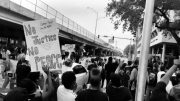Image courtesy of Creative Commons
Julie Walsh/Contributing Writer
The Steven J. Green School of International and Public Affairs is hosting a panel discussion about the current border and migration issues between Haiti and the Dominican Republic.
The panelists will include directors and professors among the FIU community, as well as a professor from Colorado State University.
“The issue of the legal status of Haitian migrants and Haitian-Dominicans has been in the news lately because of major changes taking place in how the Dominican Republic defines its citizenship,” said Ernesto Sagás, associate professor in the Ethnic Studies Department at CSU.
The Dominican Republic’s citizenship was ruled by the court that anyone of Haitian descent, born inland since 1929, is not eligible for a status.
Local and nationwide news sources have been buzzing about the ongoing tensions, deportation threats and potential international trade crisis between the D.R. and Haiti.
According to the Miami Herald, as of August 27, 2015, commerce and trade had been blocked by Haitians for 32 consecutive days.
Dominican officials have said that mass expulsions of ethnic Haitians in the D.R. will have begun summer 2015.
“Being born on Dominican soil no longer guarantees Dominican citizenship to the descendants of Haitian immigrants in that country,” said Sagás.
A court ruling in 2013 took away the citizenship of several thousands of ethnic Haitians that resided in the D.R.
Dominicans of Haitian ethnic background were being deprived of their status and left stateless, according to the Washington Post.
“It is a forced migration that the Dominicans are casting on the Haitians. But the Dominican Republic is a very poor country with shady government and is in dire need of money,” said Cisco Rodriguez, Dominican native and sophomore political science major at the University.
The D.R. has decided to end its long standing practice of recognizing Dominican people of Haitian descent as citizens, and is not considering anyone who was born in the country as automatic citizens. This would apply to anyone born after 1929 — according to an article by the Washington Post.
In response to the Washington Post, Rodriguez thinks that the D.R. is undergoing the current crisis of deporting Haitians in order to stabilize, save and improve the county’s financial status by decreasing its population.
The rioting began on July 25 when a Haitian was killed inside a bi-national market in Jimani, D.R., located on the opposite side of a gate on Haitian soil.
Following the death, several Haitians took the body to Haiti and claimed it was killed by a Dominican, which sparked riots and Haitian protests.
According to the Miami Herald, all traffic into Haiti was then suspended until further notice, as a result of the passage from D.R. into Haiti being deemed as unsafe. As a result, the flow of commerce and trade was paralyzed.
The panel discussion will indepthly explore the border and migration issues between the D.R. and Haiti. This will offer students a chance to be knowledgeable, and accurately educated on issues around the world.
“As a foreign country, we usually only grab the headlines and never really follow the whole story all the way through, be it, the counterpoints of the other side,” said Rodriguez.
Rodriguez explained that it is important to have in-depth discussions on international relations to better learn and understand foreign topics and prevent misinterpretation.
“I hope that this panel will help educate the public on a topic that affects thousands of human beings and that it will spark a dialogue and promote sensible solutions that respect the dignity and human rights of those affected,” said Sagás.
This event is free and open to the public. It will be held in at the Modesto A. Maidique Campus MARC Pavilion on Tuesday, Sept. 22 at 2:30 p.m.
news@fiusm.com






Be the first to comment on "Panel to speak on Haitian issues"